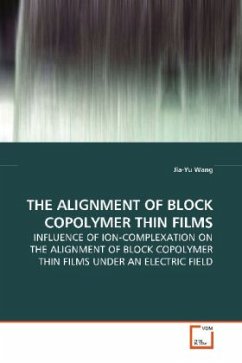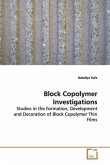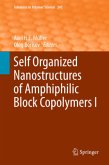With the miniaturization of devices, block
copolymers (BCPs) are emerging as promising
candidates for scaffolds and templates in the
fabrication of nanoscopic structures. Key to the use
of BCPs is control of the orientation and lateral
ordering of their microdomains in thin films. An
external electric field was previously shown to
effectively orient BCP microdomains in a desired
direction. However, complete alignment of
microdomains in BCP thin films remains a challenge
due to achieve due to the preferential interactions
of blocks at the interfaces with the electrodes.
Here, we demonstrate that lithium-PMMA complexes,
formed by adding lithium salts to polystyrene-block-
poly(methyl methacrylate) (PS-b-PMMA) copolymer,
markedly enhanced alignment of BCP microdomains in
thin films under an electric field, mainly by the
increased dielectric contrast and mediated surface
interactions, which significantly reduced the
critical field strength. As a result, the aignment
of the microdomains under the electric field was
significantly enhanced.
copolymers (BCPs) are emerging as promising
candidates for scaffolds and templates in the
fabrication of nanoscopic structures. Key to the use
of BCPs is control of the orientation and lateral
ordering of their microdomains in thin films. An
external electric field was previously shown to
effectively orient BCP microdomains in a desired
direction. However, complete alignment of
microdomains in BCP thin films remains a challenge
due to achieve due to the preferential interactions
of blocks at the interfaces with the electrodes.
Here, we demonstrate that lithium-PMMA complexes,
formed by adding lithium salts to polystyrene-block-
poly(methyl methacrylate) (PS-b-PMMA) copolymer,
markedly enhanced alignment of BCP microdomains in
thin films under an electric field, mainly by the
increased dielectric contrast and mediated surface
interactions, which significantly reduced the
critical field strength. As a result, the aignment
of the microdomains under the electric field was
significantly enhanced.








